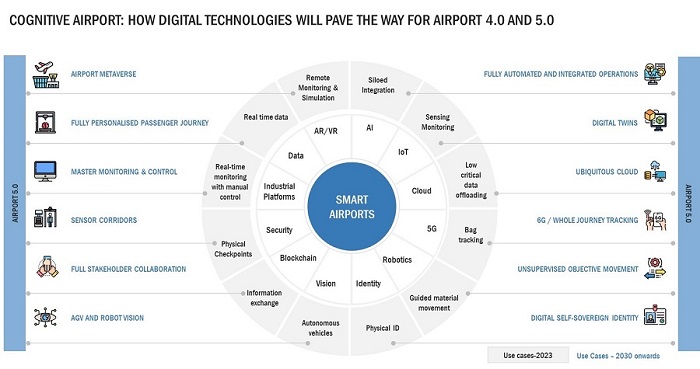
Future of Airport Industry Outlook
Future of Airport to 2030 and beyond
The aviation landscape is on the brink of a revolutionary transformation, set to redefine the experience of air travel from the ground up. The "Future of Airports Study" delves into this evolution, vividly depicting what airports will look like in 2030 and beyond. Aimed at a wide array of stakeholders, from airport operators to urban planners and tech innovators, this report is a treasure trove of insights into the next generation of air travel.
For more details, get in touch with us here

-
Adapting to the Traveler of Tomorrow: Today's travelers are more connected and diverse than ever, prompting airports to rethink their approach. The study highlights how airports are tailoring their services to meet the unique needs of various traveler personas, such as the solo explorer, the digital influencer, and the environmentally conscious passenger. Through personalized services and digital enhancements, airports strive to ensure that every journey is seamless and enjoyable.
-
Smart Airports on the Rise: The concept of 'cognitive airports' is gaining traction, with AI, machine learning, and data analytics playing pivotal roles. These smart airports can predict and respond to passenger needs in real-time, making everything from security checks to boarding smoother and more efficient.
To know about the assumptions considered for the study, For more details, get in touch with us here
-
Aerotropolis: The Airport Cities: The emergence of the aerotropolis model is reshaping the urban and economic landscapes surrounding airports. These airport cities integrate residential, commercial, and leisure spaces, creating vibrant communities where air travel is a part of daily life.
-
Seamless Journeys with Intermodal Transportation: The study emphasizes the growing importance of connecting airports with other transport modes, like trains, buses, and boats, facilitating more accessible, greener, and more efficient travel for everyone.
-
Beyond Flight Revenue: A significant shift in how airports make money is underway. Moving beyond the traditional focus on flight-related revenue, airports are now developing diverse commercial ecosystems, tapping into retail, real estate, and hospitality to create new income streams.
-
Autonomy in Airport Operations: Autonomous technologies are set to revolutionize airport operations. From self-driving vehicles ferrying passengers to automated systems handling luggage, these innovations promise to make airports more efficient and reduce the chance of human error.
-
Towards Sustainable Skies: Perhaps most crucially, the push towards net-zero emissions stands out as a defining trend. Airports are adopting sustainable practices, from energy management to waste reduction, aiming to reduce their environmental footprint drastically.
In conclusion, the "Future of Airports Study" offers an enlightening overview of the shifts and innovations shaping the future of air travel. Focusing on technology, sustainability, and passenger experience provides a roadmap for stakeholders looking to navigate the changes and opportunities in this dynamic sector. As airports evolve into more innovative, greener, and more passenger-friendly spaces, the future of aviation looks bright indeed.
For more details, get in touch with us here
80% of the Forbes Global 2000 B2B companies rely on MarketsandMarkets to identify growth opportunities in emerging technologies and use cases that will have a positive revenue impact.
- Food Packaging Market Size Set for Strong Growth Through 2030 Amid Rising Demand for Convenience Foods
- Fertilizers Industry Set to Grow at 4.1% CAGR Through 2030
- Leading Automated Guided Vehicle Companies 2024: An In-depth Analysis
- CHARGED UP: SHIFT TO E-MOBILITY AND THE EVOLUTION OF TRANSPORTATION
- Global Automotive Market: Predictions For 2024



